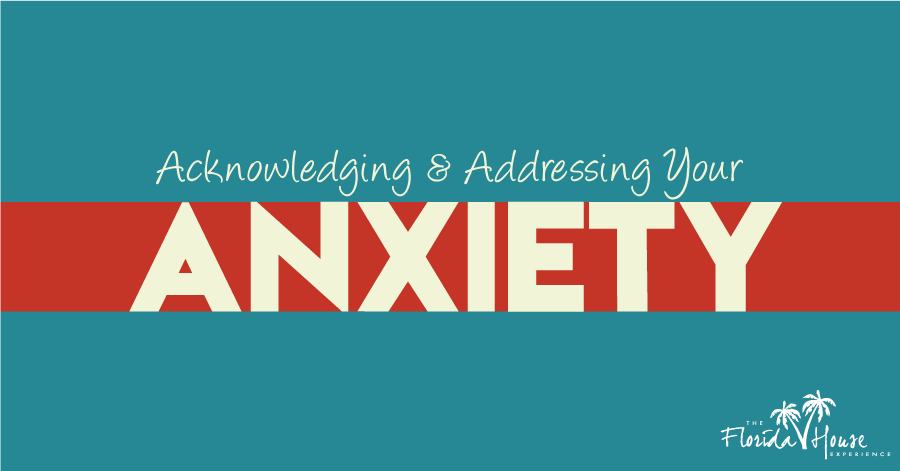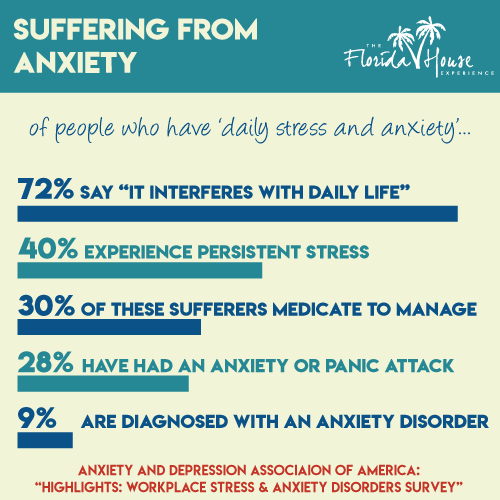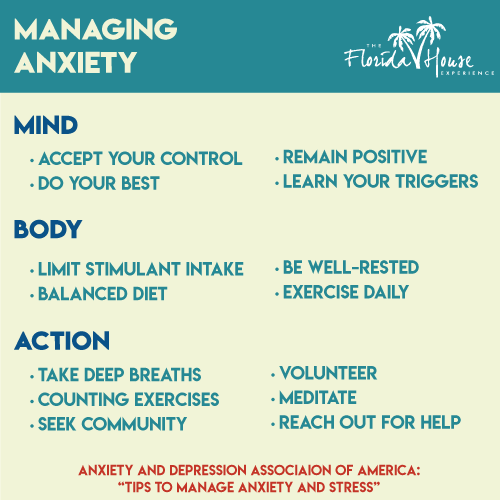
Are you concerned that you or a loved one may be struggling with an anxiety disorder? If so, you have found the right place. Here at the FHE Health, we are dedicated to helping people break the stigma of mental illness. Acknowledging and addressing your anxiety is a crucial step in the direction toward getting proper help and anxiety treatment, and in this article we will provide important tips on how to do so.
In today’s world, it seems nearly everyone is struggling with something, and we understand what it’s like. Anxiety is an issue that plagues many, yet is still somewhat misunderstood within our society. Let’s take a look at what exactly anxiety is.
What is Anxiety?
 Statistics show that 40 million adults age 18 and over in the U.S. are affected by an anxiety disorder, making it the most common mental illness in the United States. The most prevalent types of anxiety are as follows:
Statistics show that 40 million adults age 18 and over in the U.S. are affected by an anxiety disorder, making it the most common mental illness in the United States. The most prevalent types of anxiety are as follows:
- Generalized Anxiety Disorder (GAD)
- Panic Disorder (PD)
- Social Anxiety Disorder
- Specific Phobias
- Obsessive Compulsive Disorder (OCD)
- Post Traumatic Stress Disorder (PTSD)
It is important to know that it is normal to experience a certain amount of stress and anxiety in life. Stress is a normal response to challenging situations, involving psychological and physiological changes. In fact, it is what motivates us to take action and change our circumstances. However, it is important to know the difference between normal stress and a real anxiety disorder.
If you find that you cannot adjust to a new situation or that it is difficult to go about your daily routine, you may have an anxiety disorder. Some key symptoms of a true anxiety disorder to identify include but are not limited to having trouble falling asleep or staying asleep, being easily irritated, feeling overwhelmed, having racing thoughts, feeling like your heart is pounding, shaking, sweating, and feeling short of breath. In those without an anxiety disorder, during periods of normal stress, these people are able to adapt to and tackle the situation, and once it’s resolved you are able to move on and continue living life.
People with an anxiety disorder are unable to set aside their worry toward a situation, and in fact, they may not always even be able to identify a situation which is the cause of their anxiety. They may feel they have no control over their anxious feelings no matter how hard they try.
The reason it seems so difficult to control feelings in a true anxiety disorder is that it involves a chemical imbalance in the brain. Certain neurotransmitters, which are responsible for controlling the balance of emotions in your brain, are not working properly. It is important to know that if you have an anxiety disorder, you are not alone, and that anxiety treatment is always possible. Here at FHE Health, we want to assure you that we are always ready to help you. We are made up of a team of highly qualified healthcare professionals dedicated to giving you the help and anxiety treatment that you need.
Acknowledging that you have anxiety is no easy task. The stigma that surrounds anxiety and other mental illness has created a culture which is scared to address these very real issues. But the more we address it, the more help we can get for ourselves and our friends and family. If you or someone you know is exhibiting signs or symptoms of an anxiety disorder, it is important to seek help as soon as possible. One of the reasons being that certain symptoms such as sweating or shortness of breath can also be signs of more serious conditions such as asthma or thyroid problems. See a doctor or other trusted medical professional as soon as you can. Once these conditions are ruled out and you are medically cleared, you can really begin to address your anxiety and seek the proper treatment.
How to Effectively Address your Anxiety
 So, where do you start? It may seem like a daunting or overwhelming task, but rest assured there are many different ways to get help and it all begins with taking it one step at a time. Start with reaching out to a family member, close friend, or other trusted person in your life. Share with them what’s going on and confess that you would like to receive help. This can be scary for someone with anxiety to do, especially for someone with social anxiety disorder. Know that the people in your life care about you and are listening without judgment. You may even be surprised to learn that you are not alone in your struggle. This is a huge step in the right direction, and with the help of these people in your life, you can move forward in getting anxiety treatment.
So, where do you start? It may seem like a daunting or overwhelming task, but rest assured there are many different ways to get help and it all begins with taking it one step at a time. Start with reaching out to a family member, close friend, or other trusted person in your life. Share with them what’s going on and confess that you would like to receive help. This can be scary for someone with anxiety to do, especially for someone with social anxiety disorder. Know that the people in your life care about you and are listening without judgment. You may even be surprised to learn that you are not alone in your struggle. This is a huge step in the right direction, and with the help of these people in your life, you can move forward in getting anxiety treatment.
After reaching out for social support, you can begin to weigh your options in regards to anxiety treatment. You should begin by speaking with a licensed therapist who is familiar with anxiety disorders and their treatments. Speaking with a trusted professional who knows exactly what they’re doing can help you feel at ease with your situation. Once your therapist has gotten to know you, they may recommend several different types of anxiety treatments. Some of the most recommended types include:
- Cognitive-behavior therapy
- Exposure therapy
- Medications
Cognitive-behavior therapy is a form of treatment that involves helping the individual to identify unhelpful patterns of thought and behavior, and challenging them to change these patterns. On the other hand, exposure therapy involves direct confrontation to the factors that trigger anxiety and repeating this process until the anxiety diminishes. Finally, medication is an option that is mainly used only when other forms of therapy have not worked. Certain medications may be prescribed to help an individual when their anxiety is so serious that they cannot cope with daily life. It is important to always consider the side-effects of medications and the prospect that they can be addictive. Discussing these options with your therapist in an honest and open way is crucial to deciding which anxiety treatment will be the most beneficial.
Get Help Today
You don’t have to face anxiety alone. If you or someone you know is struggling with an anxiety disorder, we at FHE Health want you to know that treatment and recovery are possible. We are a dedicated team of compassionate professionals, and we firmly believe that our recommended treatments for patients have been widely effective. We are here to work alongside you and help you achieve the recovery you deserve. Anxiety treatment is only a step away. If you are ready to take that first step toward recovery, please do not hesitate to contact us at (833) 596-3502. Our compassionate team of counselors is available 24/7 to take your call today.






